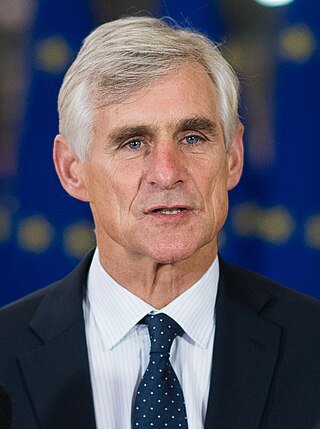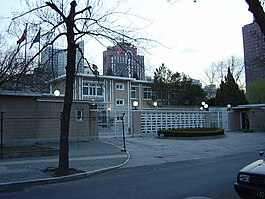
The Byelorussian SSR was one of only two Soviet republics to be separate members of the United Nations. Both republics and the Soviet Union joined the UN when the organization was founded in 1945.

The Copenhagen criteria are the rules that define whether a country is eligible to join the European Union. The criteria require that a state has the institutions to preserve democratic governance and human rights, has a functioning market economy, and accepts the obligations and intent of the European Union.

Kinga Gál is a Hungarian politician and Member of the European Parliament (MEP) from Hungary. She is a member of Fidesz.

Relations between the European Union (EU) and the People's Republic of China (PRC) or Sino–European relations are bilateral relations that were established in 1975 between the PRC and the European Community. The EU is the PRC's largest trading partner, and the PRC is the EU's largest trade partner.

Switzerland is not a member state of the European Union (EU). It is associated with the Union through a series of bilateral treaties in which Switzerland has adopted various provisions of European Union law in order to participate in the Union's single market, without joining as a member state. Among Switzerland's neighbouring countries, all but one are EU member states.

Bilateral relations exist and existed between Austria and Russia and their predecessor states. Since October 1955, the Republic of Austria maintains the constitutionally-mandated status of neutrality; the country is a founding member of the Organisation for Economic Co-operation and Development (OEEC). Austria joined the EU in 1995. Russia is a permanent member of the United Nations Security Council, a partner of ASEAN, a member of the Shanghai Cooperation Organisation (SCO), the G20, the Asia-Pacific Economic Cooperation (APEC), the Organization for Security and Co-operation in Europe (OSCE), as well as the leading member state of the Commonwealth of Independent States (CIS), the Collective Security Treaty Organization (CSTO), and the Eurasian Economic Union (EEU). Both countries are members of the Organization for Security and Co-operation in Europe and the World Trade Organization (WTO).

The Hungarians in Ukraine number 156,600 people according to the Ukrainian census of 2001 and are the third largest national minority in the country. Hungarians are largely concentrated in the Zakarpattia Oblast, where they form the largest minority at 12.1% of the population. In the area along the Ukrainian border with Hungary, Hungarians form the majority.

Relations between the European Union and the Republic of India are currently defined by the 1994 EU–India Cooperation Agreement. The EU is a significant trade partner for India and the two sides have been attempting to negotiate a free trade deal since 2007. Indo-EU bilateral trade stood at US$104.3 billion in the financial year 2018–19.

European Union–Iran relations are the bilateral relations between Iran and the European Union (EU). The EU is Iran's largest trading partner, along with China and the United Arab Emirates. Trade with Iran is subject to the general EU import regime and the EU supports the goal of Iranian accession to the World Trade Organization (WTO). The EU has accused and criticized Iran for human rights violations, which led to diplomatic tensions, but both sides aim at improving and normalizing relations. Should Turkey's accession to the EU take place, Iran will border the European Union.

Relations between the European Union (EU) and Turkey were established in 1959, and the institutional framework was formalized with the 1963 Ankara Agreement. Albeit not officially part of the European Union, Turkey is one of the EU's main partners and both are members of the European Union–Turkey Customs Union. Turkey borders two EU member states: Bulgaria and Greece.

Hilde Vautmans is a Belgian politician of the Open Vlaamse Liberalen en Democraten who has been serving as a Member of the European Parliament since January 2015, representing the Dutch-speaking electoral college of Belgium.

Karin Kneissl is an Austrian diplomat, journalist, and politician, having served as Minister of Foreign Affairs between 2017 and 2019. Prior to assuming her government position, she was a lecturer.

Article 7 of the Treaty on European Union is a procedure in the treaties of the European Union (EU) to suspend certain rights from a member state. While rights can be suspended, there is no mechanism to expel a state from the union.

Cooperation between China and Central and Eastern European Countries is an initiative by the Chinese Ministry of Foreign Affairs to promote business and investment relations between China and 14 countries of Central and Eastern Europe : Albania, Bosnia and Herzegovina, Bulgaria, Croatia, the Czech Republic, Greece, Hungary, Montenegro, North Macedonia, Poland, Romania, Serbia, Slovakia, and Slovenia. Prior to their 2022 withdrawal, Estonia, Latvia, and Lithuania were members of the initiative.

Alexander Georg Nicolas Schallenberg OMRI is an Austrian diplomat, jurist, and politician who has served as Minister for Foreign Affairs in the government of Chancellor Karl Nehammer since 2021, previously holding the office from 2019 to 2021. A member of the Austrian People's Party (ÖVP), he held the position in the second government of Sebastian Kurz, before briefly serving as Chancellor of Austria as Kurz's successor from 11 October to 6 December 2021.

The Second Kurz government was the 33rd Government of Austria. Led by Sebastian Kurz as chancellor and Werner Kogler as vice-chancellor, it was sworn in by President Alexander Van der Bellen on 7 January 2020. It was officially dissolved and succeeded by the Schallenberg government on 11 October 2021.

Karl Nehammer is an Austrian politician who is the 32nd and current chancellor of Austria since 6 December 2021. A member of the Austrian People's Party (ÖVP), he previously was Minister of the Interior from 2020 to 2021, general secretary of the ÖVP from 2018 to 2020, as well as a member of the National Council from 2017 to 2020. Nehammer assumed the chancellorship as the successor of Alexander Schallenberg, who resigned to return as Minister of Foreign Affairs.
Legislative elections will be held in Austria by autumn 2024 to elect the 28th National Council, the lower house of Austria's bicameral parliament.

Michael Linhart is an Austrian diplomat and politician who was appointed as the new Austrian Ambassador at Berlin on 15 December 2021. Before that, he served as minister of foreign affairs of the Republic of Austria in the Schallenberg government from 11 October to 6 December 2021, ambassador of the Republic of Austria to France from 2018 to 2021 and Secretary-General at the Federal Ministry for Europe, Integration and Foreign Affairs from 2013 to 2018.

The Global Gateway Initiative is a worldwide strategy by the European Union to invest in infrastructure projects worldwide. The project was initiated by the EU Commission under the leadership of Ursula von der Leyen. Over the period 2021–2027, the EU will invest €300 billion. Investment into Africa is the regional priority of the initiative, as half the funds are allocated to projects to improve the green transition, digital transition, sustainable economic growth, health care and education in Africa.






















